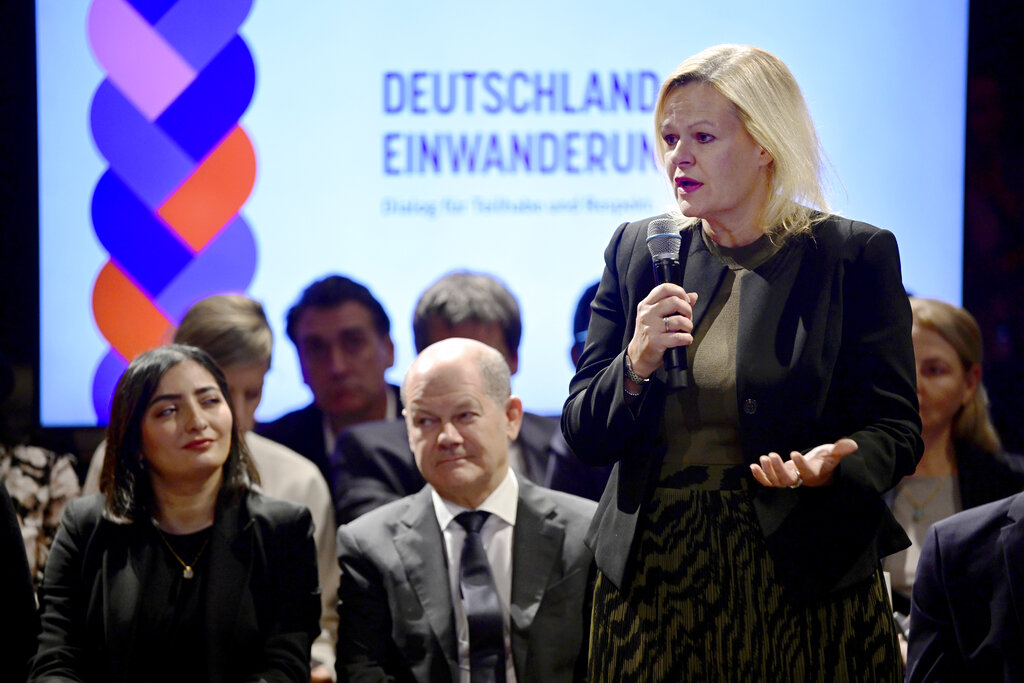The German federal government’s plan to make naturalization easier and reform the country’s citizenship law is gaining momentum, with critics saying it will result in up to 2 million migrants receiving citizenship overnight and radically reduce the value of the German passport.
The far-left government will begin next week with a departmental vote based on a draft from the Federal Ministry of the Interior by Nancy Faeser (SPD). Faeser has been a key proponent of mass immigration.
However, both the Alternative for Germany (AfD) and the Christian Democratic Union (CDU) remain opposed to the plan, with the CDU warning of a “180-degree turnaround” on citizenship law.

According to the draft, immigrants will generally be able to obtain a German passport after only five years instead of the current eight, and after only three years (currently six) in the case of special skills such as language acquisition or voluntary work. However, the draft also outlines how a lack of language skills will be less of an obstacle to naturalization. There will additionally be several broad exceptions for “hardship” and for immigrants over 67 years of age, with the latter being exempted from written naturalization and language tests.
[pp id=57346]
The plan comes at a time when a large majority of Germans remain opposed to mass immigration, according to polling. Over 1.2 million migrants arrived in Germany just in 2022, which led to a massive burden on housing, social services, and education. In addition, polls show a massive collapse in support for Germany’s current left-wing government coalition, with the government seeing record-low approval.
The mass violence seen across the country during New Year’s Eve, which involved migrants who attacked police, rescue services, and firefighters, has also shocked the country.
A new pool of left-wing voters?
Many of those same migrants who were arrested for New Year’s Eve violence would soon become citizens under the new German law; this would help the left-wing government by hiding the fact that so many of the individuals responsible for crime in Germany have a foreign background. Simply put, those arrested during New Year’s Eve and for many other crimes would then be “German” citizens, and determining where they came from would be immensely more difficult. This would be a setback for skeptics of immigration who point to the poor record of integration and high crime levels seen in Germany’s migrant communities.
Perhaps even more important for the left is the fact that millions of foreigners, many of them sympathetic to left-wing parties, could soon be citizens who can vote in elections. With the government facing falling approval rates and a difficult economic environment, turning foreigners into German citizens may be the only way to lift their political fortunes.
The opposition CDU/CSU, meanwhile, opposes the reform. Its parliamentary manager, Thorsten Frei (CDU), told Die Welt: “We only know the plans of the traffic light government from the press. What I read about it sounds like a 180-degree turn in citizenship law.”
[pp id=18248]
Germany is very attractive to people from abroad who would like to live and work here, he said; this is generally positive, and the country needs immigration in the labor market.
“The plans of the traffic light (coalition) seem to me like a devaluation of German citizenship. The SPD and the Greens are on the wrong track here. The government plans are the opposite of what we want. We want people to integrate here and become part of our society. The SPD and the Greens want quasi-naturalization without integration efforts,” Frei said.
He said he is “very curious” how the FDP will now behave. “My fear is that the FDP will cave and open the doors for a policy in which we as a country can have no interest.”
Stephan Thomae, parliamentary director of the FDP parliamentary group, told Die Welt: “Germany’s economic strength and prosperity also depend on whether we succeed in selectively steering foreign workers into the German labor market. Therefore, in addition to an immigration law with a points system, we want to make it possible for foreign people who meet certain requirements and want to become a permanent part of our society to obtain German citizenship more quickly. Because if someone has integrated well, that’s a success that we want to reward and also helps make Germany more attractive to foreign workers.”






